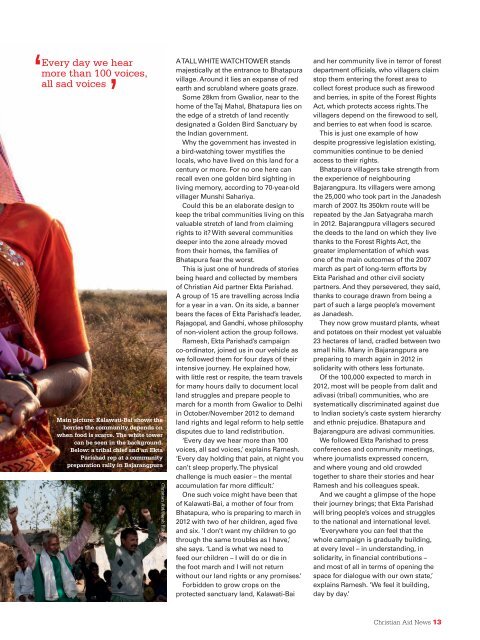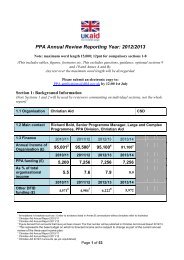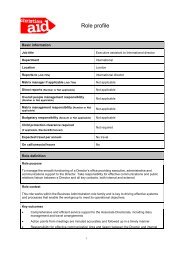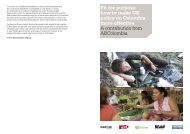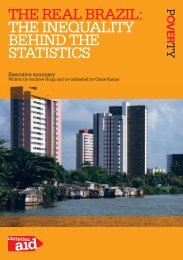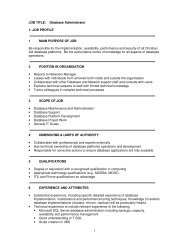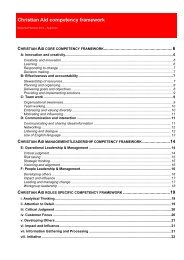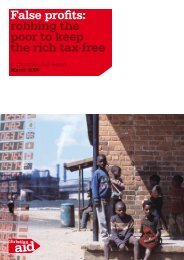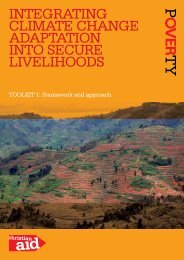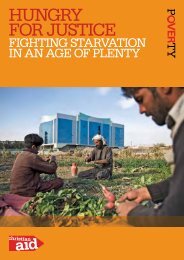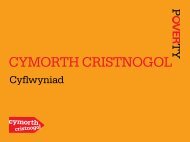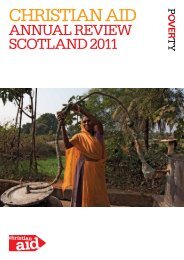CHRISTIAN AID NEWS
CHRISTIAN AID NEWS
CHRISTIAN AID NEWS
You also want an ePaper? Increase the reach of your titles
YUMPU automatically turns print PDFs into web optimized ePapers that Google loves.
Every day we hear<br />
more than 100 voices,<br />
all sad voices<br />
Main picture: Kalawati-Bai shows the<br />
berries the community depends on<br />
when food is scarce. The white tower<br />
can be seen in the background.<br />
Below: a tribal chief and an Ekta<br />
Parishad rep at a community<br />
preparation rally in Bajarangpura<br />
Christian Aid/Sarah Filbey<br />
A tAll white wAtchtower stands<br />
majestically at the entrance to Bhatapura<br />
village. Around it lies an expanse of red<br />
earth and scrubland where goats graze.<br />
Some 28km from Gwalior, near to the<br />
home of the taj Mahal, Bhatapura lies on<br />
the edge of a stretch of land recently<br />
designated a Golden Bird Sanctuary by<br />
the indian government.<br />
why the government has invested in<br />
a bird-watching tower mystifies the<br />
locals, who have lived on this land for a<br />
century or more. For no one here can<br />
recall even one golden bird sighting in<br />
living memory, according to 70-year-old<br />
villager Munshi Sahariya.<br />
could this be an elaborate design to<br />
keep the tribal communities living on this<br />
valuable stretch of land from claiming<br />
rights to it with several communities<br />
deeper into the zone already moved<br />
from their homes, the families of<br />
Bhatapura fear the worst.<br />
this is just one of hundreds of stories<br />
being heard and collected by members<br />
of christian Aid partner ekta Parishad.<br />
A group of 15 are travelling across india<br />
for a year in a van. on its side, a banner<br />
bears the faces of ekta Parishad’s leader,<br />
rajagopal, and Gandhi, whose philosophy<br />
of non-violent action the group follows.<br />
ramesh, ekta Parishad’s campaign<br />
co-ordinator, joined us in our vehicle as<br />
we followed them for four days of their<br />
intensive journey. he explained how,<br />
with little rest or respite, the team travels<br />
for many hours daily to document local<br />
land struggles and prepare people to<br />
march for a month from Gwalior to Delhi<br />
in october/November 2012 to demand<br />
land rights and legal reform to help settle<br />
disputes due to land redistribution.<br />
‘every day we hear more than 100<br />
voices, all sad voices,’ explains ramesh.<br />
‘every day holding that pain, at night you<br />
can’t sleep properly. the physical<br />
challenge is much easier – the mental<br />
accumulation far more difficult.’<br />
one such voice might have been that<br />
of Kalawati-Bai, a mother of four from<br />
Bhatapura, who is preparing to march in<br />
2012 with two of her children, aged five<br />
and six. ‘i don’t want my children to go<br />
through the same troubles as i have,’<br />
she says. ‘land is what we need to<br />
feed our children – i will do or die in<br />
the foot march and i will not return<br />
without our land rights or any promises.’<br />
Forbidden to grow crops on the<br />
protected sanctuary land, Kalawati-Bai<br />
and her community live in terror of forest<br />
department officials, who villagers claim<br />
stop them entering the forest area to<br />
collect forest produce such as firewood<br />
and berries, in spite of the Forest rights<br />
Act, which protects access rights. the<br />
villagers depend on the firewood to sell,<br />
and berries to eat when food is scarce.<br />
this is just one example of how<br />
despite progressive legislation existing,<br />
communities continue to be denied<br />
access to their rights.<br />
Bhatapura villagers take strength from<br />
the experience of neighbouring<br />
Bajarangpura. its villagers were among<br />
the 25,000 who took part in the Janadesh<br />
march of 2007. its 350km route will be<br />
repeated by the Jan Satyagraha march<br />
in 2012. Bajarangpura villagers secured<br />
the deeds to the land on which they live<br />
thanks to the Forest rights Act, the<br />
greater implementation of which was<br />
one of the main outcomes of the 2007<br />
march as part of long-term efforts by<br />
ekta Parishad and other civil society<br />
partners. And they persevered, they said,<br />
thanks to courage drawn from being a<br />
part of such a large people’s movement<br />
as Janadesh.<br />
they now grow mustard plants, wheat<br />
and potatoes on their modest yet valuable<br />
23 hectares of land, cradled between two<br />
small hills. Many in Bajarangpura are<br />
preparing to march again in 2012 in<br />
solidarity with others less fortunate.<br />
of the 100,000 expected to march in<br />
2012, most will be people from dalit and<br />
adivasi (tribal) communities, who are<br />
systematically discriminated against due<br />
to indian society’s caste system hierarchy<br />
and ethnic prejudice. Bhatapura and<br />
Bajarangpura are adivasi communities.<br />
we followed ekta Parishad to press<br />
conferences and community meetings,<br />
where journalists expressed concern,<br />
and where young and old crowded<br />
together to share their stories and hear<br />
ramesh and his colleagues speak.<br />
And we caught a glimpse of the hope<br />
their journey brings; that ekta Parishad<br />
will bring people’s voices and struggles<br />
to the national and international level.<br />
’everywhere you can feel that the<br />
whole campaign is gradually building,<br />
at every level – in understanding, in<br />
solidarity, in financial contributions –<br />
and most of all in terms of opening the<br />
space for dialogue with our own state,’<br />
explains ramesh. ‘we feel it building,<br />
day by day.’<br />
Christian Aid News 13


